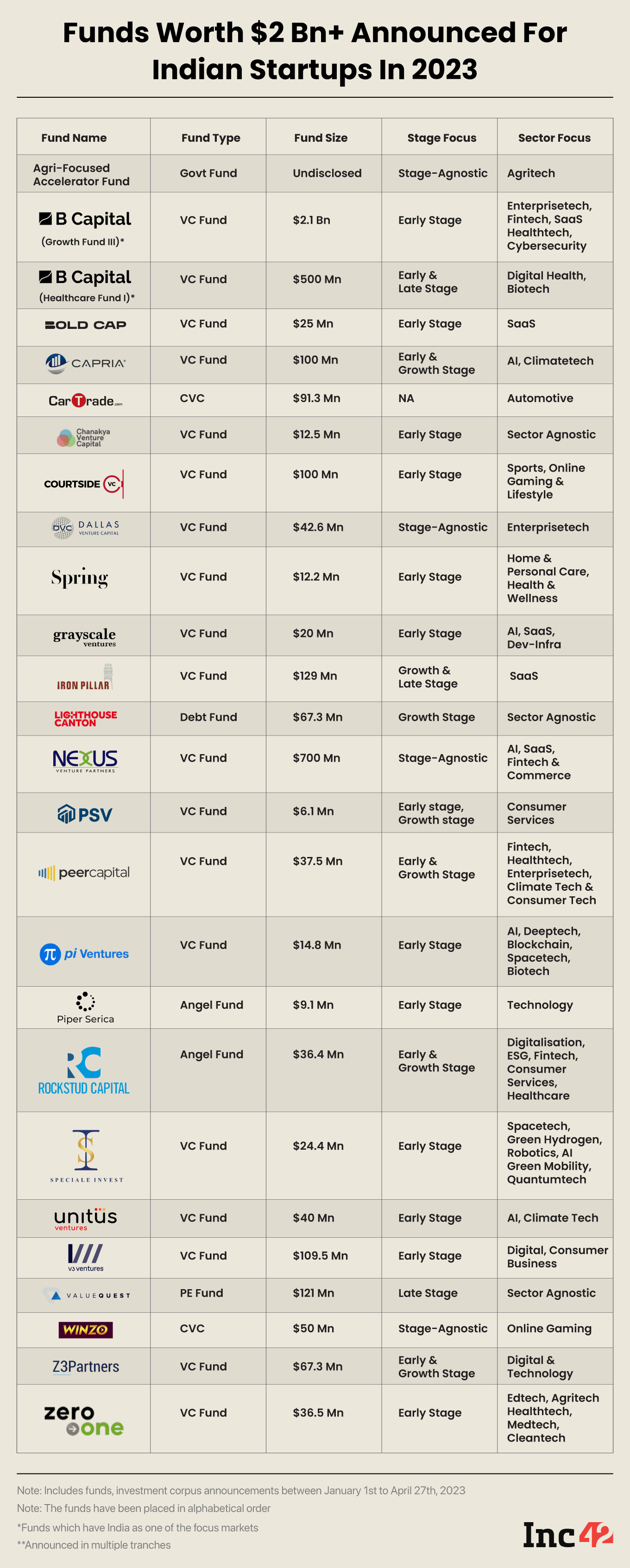SEBI has asked fund trustees to find out the proportion of "high-risk" clients and non-profit organisations in each VC fund
The regulator is also looking into the nature of upstream investors or LPs in alternative investment funds or AIFs
SEBI questioning VC funds and their trustees on LP constitution might have an even wider impact on startup funding which has plummeted sharply in 2023
It’s not been the best of times for venture capital (VC) firms and startup investors, with downturn across segments and a slowdown in deal flow, especially beyond the early stage. But in what could pose more challenges for VCs, capital markets regulator SEBI is currently looking into the nature of upstream investors in alternative investment funds or AIFs.
Reports this week indicated that SEBI has asked fund trustees to find out the proportion of “high-risk” clients and non-profit organisations in each of the funds they are engaged with.
The regulator is also seeking details of the percentage of investors based in countries that are on the Financial Action Task Force’s (FATF) grey list or the United Nations Security Council’s (UNSC) consolidated list for money laundering and terror financing activities. Trustees have also been asked to furnish information on LPs or clients that are being probed or were probed in the past by SEBI or any other Indian government agency.
Besides this, SEBI has reportedly served show cause notices to IDBI Trusteeship Services as well as Vistra, two companies that offer trusteeship services to AIFs. According to an ET report, SEBI is looking at trustee companies to prevent oversight, violations, and slip-ups by fund managers.
These new developments are just some of the many steps taken by SEBI in recent months as the regulator has intensified scrutiny around valuations, carry structures for VC funds and even spillovers between various funds that are operated by AIFs.
Why SEBI Is Stepping Up Scrutiny
Here, it is important to understand exactly what role trustees play when it comes to VC funds. Their primary responsibility is to be a guardrail against conflicts of interest and other issues arising from AIF investments in India. Trustees also enable the registration of AIFs according to SEBI norms, manage investment management agreements, private placement offers, and appointment of auditors.
Further, trustees are tasked with addressing investor grievances, approving financials and tax filings of AIFs and other compliance-related activities. It must be noted that AIFs do not need trustees to operate in India, though having a trustee removes much of the compliance and grievance redressal burden from fund managers, particularly for new funds with first-time fund managers. A trustee is essentially a bridge between the fund and its LPs or SEBI.
Unlike mutual funds, which as per law must have a trust format, AIFs can be set up as a company or limited liability partnership or trust. However, a predominant number of AIFs are formed as trust.
The reason for trustees being served show cause notices is not clear but reports suggest IDBI Trusteeship is being investigated for violation of investment norms, whereas Vistra has faced complaints from upstream investors or limited partners (LPs) of VC funds who reportedly did not get an exit following an extension of the fund life.
If indeed these trusteeship services are found to be in violation of SEBI norms, it could result in the entities being barred from offering these services to new funds for up to a year.
The other development related to SEBI’s questions to AIF trustees on fund constitution might have an even wider impact on startup funding. In this context, trustees have reportedly been asked to assess the degree of ‘enhanced due diligence’ carried out by the funds for receiving investments from ‘politically exposed persons’ and other sensitive clients.
As per Venkatesh Prabhu, founder of MITCON Credentia Trusteeship Services, the regulator is looking at due diligence on the part of AIFs when raising funds from LPs and checking their jurisdictions while onboarding them. This is particularly important given that individual or institutional LPs in certain countries are subject to higher scrutiny from the government.
This is because some countries are classified as risky in the FATF grey list due to local laws related to anti-money laundering. Previously, the FATF grey list included territories such as Mauritius, where several of the larger VC funds are registered.
SEBI’s questions are potentially related to the higher FDI inflow into Indian AIFs over the past few years as compared to the lower domestic LP contribution to AIFs. As per Inc42 data, the Indian startup ecosystem has seen the launch of 26 new India-focussed funds in 2023 alone with a total corpus of over $2 Bn.

However, a bulk of these new funds have raised capital from foreign LPs. AIFs that raise only from domestic LPs are limited in number, and over the past year, we have seen a bigger push from stakeholders to tap the domestic LP pool.
Domestic Capital Vs Foreign LPs
Data suggests that domestic capital contributes less than 10% of the total capital invested in Indian startups, so having a 100% domestic LP pool is a differentiation for many funds.
One example is TVS Capital Fund, which has raised three funds till date with 100% domestic capital. After closing its third fund in 2021, TVS Capital is gearing up to raise money for its fourth fund, which will see commitments in 2023 and 2024.
Speaking about why the fund only raises domestic capital, TVS Capital’s chairman and managing director Gopal Srinivasan told Inc42 earlier this year. “It’s great to hear the stories of unicorns, soonicorns and decacorns, but when you realise that all profit has gone to some American pension fund or some foreign investor, what economic problems are we solving in India?”
Interestingly, SEBI has stepped up scrutiny at a time when a number of LPs have already started asking VCs questions about the spate of frauds and other discrepancies in their portfolio. For instance, in February this year, SIDBI approached investors of GoMechanic to question them on how the startup evaded their due diligence when it comes to revenue reporting.
Sources close to a SEBI-registered AIF told Inc42 then that SIDBI was not the only limited partner grilling VCs over potential fraud. However, given the Finance Ministry’s jurisdiction over SIDBI, there could be some potential regulatory action against VC funds in the future.
More Distress For Indian VCs?
SEBI’s questions to fund trustees could lead to further distress for funds that are in the market to raise capital from LPs. Larger funds are already facing headwinds when raising from Indian LPs, largely because domestic LP management is a pain point for these funds.
Indian LPs are looking for more granular details from AIFs on potential deals, and often demand greater say in where funds are deployed, according to Anirudh Damani, managing partner and director at Artha Venture Fund. As this is not possible in a large fund, a lot of Indian LPs are focussing on early-stage micro VC funds and angel networks.
This in turn means that Indian LPs do not get a big share of the upside that large funds see in valuation bumps and exits at the later stage. The small base of Indian LPs and the lack of valuable exits for these LPs has created a vicious circle for larger funds who are forced to raise from foreign investors.
The global macroeconomic situation and the subsequent business slowdown for startups in 2022 and 2023 has resulted in a sharp drop in startup funding since last year. According to Inc42’s analysis, Indian startups raised a total of $3 Bn in Q1 2023, down 75% from the $12 Bn raised in Q1 2022, indicating their cash-starved state.
SEBI’s questions could further slow down deal-making for startups that are in talks with investors and could also impact the fundraising for funds themselves.
This is the latest instance of SEBI looking into AIFs for potential violations. Since early 2021, SEBI has introduced new changes for the VC ecosystem, including new definitions for fund managers. SEBI also barred AIFs from having spillovers from the LP pool for one fund into another separate fund, besides mandating the appointment of independent trustees.
In mid-2022, SEBI also stepped up scrutiny of how funds calculate valuations for the startups in which they invest. SEBI’s inquiries into startup valuations came on the heels of complaints about startups listing publicly at super-high valuations and then facing a slide after listing, resulting in losses for retail investors. The regulator was later reported to have proposed a standardised valuation methodology for AIFs and their new investments.
Further, according to sources in the VC ecosystem, regulators are also looking at how VCs have structured their carry escrow accounts, which is how general partners or GPs in VC funds distribute profits internally after returns to LPs based on their contributed capital, undrawn commitment and preferred returns.
In January this year, SEBI sent notices to AIFs for not following the timeline of fund tenures specified in their offer documents which they use to raise capital from LPs. Funds were said to have extended their deployment timelines without SEBI approvals for such extensions.
































 Ad-lite browsing experience
Ad-lite browsing experience